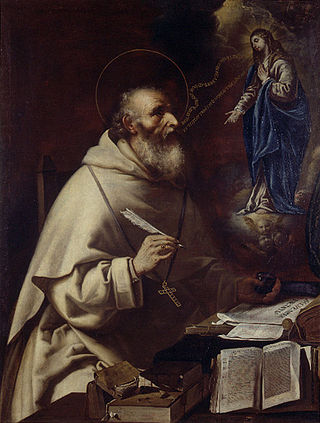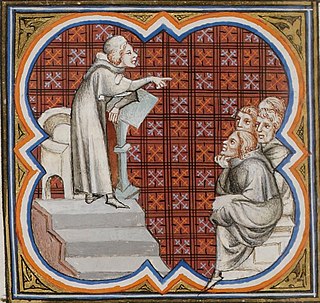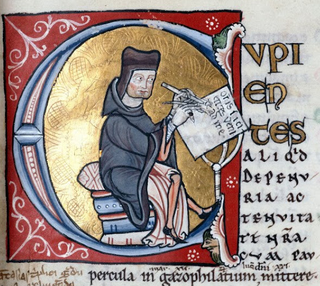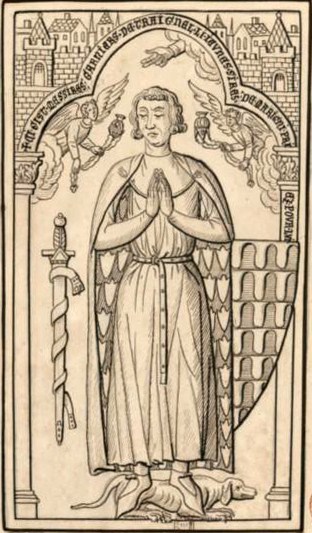
Albertus Magnus, also known as Saint Albert the Great, Albert of Swabia or Albert of Cologne, was a German Dominican friar, philosopher, scientist, and bishop, considered one of the greatest medieval philosophers and thinkers.

Amalric of Bena was a French theologian, philosopher and sect leader, after whom the Amalricians are named. Reformers such as Martin Luther considered him to be a proto-Protestant.

Stephen Langton was an English cardinal of the Catholic Church and Archbishop of Canterbury from 1207 until his death in 1228. The dispute between King John of England and Pope Innocent III over his election was a major factor in the crisis which produced the Magna Carta in 1215. Langton is also credited with having divided the Bible into the standard modern arrangement of chapters used today.

Scholasticism was a medieval school of philosophy that employed a critical organic method of philosophical analysis predicated upon Aristotelianism and the Ten Categories. Christian scholasticism emerged within the monastic schools that translated scholastic Judeo-Islamic philosophies, and "rediscovered" the collected works of Aristotle. Endeavoring to harmonize his metaphysics and its account of a prime mover with the Latin Catholic dogmatic trinitarian theology, these monastic schools became the basis of the earliest European medieval universities, and thus became the bedrock for the development of modern science and philosophy in the Western world. Scholasticism dominated education in Europe from about 1100 to 1700. The rise of scholasticism was closely associated with these schools that flourished in Italy, France, Portugal, Spain and England.

Robert Grosseteste, also known as Robert Greathead or Robert of Lincoln, was an English statesman, scholastic philosopher, theologian, scientist and Bishop of Lincoln. He was born of humble parents in Suffolk, but the association with the village of Stradbroke is a post-medieval tradition. Upon his death, he was revered as a saint in England, but attempts to procure a formal canonisation failed. A. C. Crombie called him "the real founder of the tradition of scientific thought in medieval Oxford, and in some ways, of the modern English intellectual tradition". As a theologian, however, he contributed to increasing hostility to Jews and Judaism, and spread the accusation that Jews had purposefully suppressed prophetic knowledge of the coming of Christ, through his translation of the Testaments of the Twelve Patriarchs.

Jean Buridan was an influential 14th‑century French philosopher.

Peter Lombard was an Italian scholastic theologian, Bishop of Paris, and author of Four Books of Sentences which became the standard textbook of theology, for which he earned the accolade Magister Sententiarum.
David of Dinant was a pantheistic philosopher. He may have been a member of, or at least been influenced by, a pantheistic sect known as the Amalricians. David was condemned by the Church in 1210 for his writing of the "Quaternuli", which forced him to flee Paris. When and where he died is unknown; all that can be ascertained is that he died after the year 1215, as he was condemned again in the council of 1215.

The Condemnations at the medieval University of Paris were enacted to restrict certain teachings as being heretical. These included a number of medieval theological teachings, but most importantly the physical treatises of Aristotle. The investigations of these teachings were conducted by the Bishops of Paris. The Condemnations of 1277 are traditionally linked to an investigation requested by Pope John XXI, although whether he actually supported drawing up a list of condemnations is unclear.
Philip the Chancellor, (French: Philippe le Chancelier) also known as "Philippus Cancellarius Parisiensis" (Philip, Chancellor of Paris) (c 1160–December 26, 1236) was a French theologian, Latin lyric poet, and possibly a composer as well. He was Chancellor of Notre-Dame de Paris starting in 1217 until his death, and was also Archdeacon of Noyon. Philip is portrayed as an enemy to the Mendicant orders becoming prevalent at the time, but this has been greatly exaggerated. He may have even joined the Franciscan order soon before his death.
Sylvester Maurus was an Italian Scholastic theologian.

William of Auvergne, also known as William of Paris, was a French theologian and philosopher who served as Bishop of Paris from 1228 until his death. He was one of the first western European philosophers to engage with and comment extensively upon Aristotelian and Islamic philosophy.
Robert of Courson or Courçon was a scholar at the University of Paris and later a cardinal and papal legate.

Maurice Marie Charles Joseph De Wulf (1867–1947), was a Belgian Thomist philosopher, professor of philosophy at the Catholic University of Leuven, was one of the pioneers of the historiography of medieval philosophy. His book History of Medieval Philosophy appeared first in 1900 and was followed by many other editions and translations.

Medieval philosophy is the philosophy that existed through the Middle Ages, the period roughly extending from the fall of the Western Roman Empire in the 5th century until after the Renaissance in the 13th and 14th centuries. Medieval philosophy, understood as a project of independent philosophical inquiry, began in Baghdad, in the middle of the 8th century, and in France and Germany, in the itinerant court of Charlemagne in Aachen, in the last quarter of the 8th century. It is defined partly by the process of rediscovering the ancient culture developed in Greece and Rome during the Classical period, and partly by the need to address theological problems and to integrate sacred doctrine with secular learning. This is one of the defining characteristics in this time period. Understanding God was the focal point of study of the philosophers at that time, Muslim and Christian alike.
Gilles de Corbeil was a French royal physician, teacher, and poet. He was born in approximately 1140 in Corbeil and died in the first quarter of the 13th century. He is the author of four medical poems and a scathing anti-clerical satire, all in Latin dactylic hexameters.

Peter Abelard was a medieval French scholastic philosopher, leading logician, theologian, poet, composer and musician.

Dominic of Flanders was a French-Flemish Dominican philosopher and Scholastic author, known to have been a renowned Thomist. His commentaries on Aristotle and on Thomas Aquinas were frequently printed, the most famous being his commentary on Aristotle’s Metaphysics. This Commentaria is commonly known to have been dedicated to Lorenzo de’ Medici.

Garnier de Traînel was the bishop of Troyes from 1193 until his death. He took part in the Fourth Crusade (1202–1204) and in the founding of the Latin Empire.
James of Douai was a French philosopher who taught at the University of Paris.














